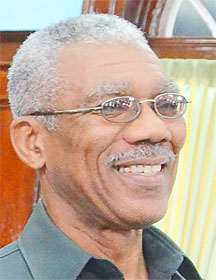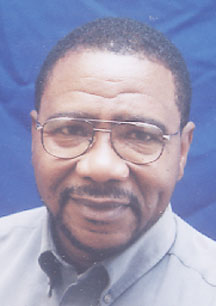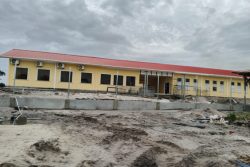A year into the formation of A Partnership for National Unity (APNU), leaders say the coalition is a real step towards shared governance despite the PPP/C’s pretence to be running a ‘winner-take-all’ government.
APNU, which emerged as the main opposition at last year’s polls, is embarking on first anniversary celebrations, and at a news conference yesterday leader David Granger reiterated its goal to “enhance governmental accountability and to accelerate national development” as well as its commitment has been to “establish a government of national unity that is committed to the proposition that all Guyanese are entitled to a good life.”
Granger identified the establishment of the new regime for the parliamentary committees and APNU’s concerted effort with the AFC to make the national budget more people-oriented as two of the coalition’s major accomplishments.

“We (APNU and AFC) took a position—we have been in touch since December 1—that the budget be more people-centred, so that we can get more development in the country and we did not see in the national budget anything that would significantly improve the lives of the people and we took action to prevent the budget in the form it was presented from being approved. We insisted on certain changes and when those were not made we took the action, which we are empowered to do,” Granger said.
Although Granger noted that both major achievements are being challenged in the courts by the government, he said the court action would serve as an important step towards establishing the supremacy of the legislative arm of the government and towards a long, strategic, constitutional development of Guyana and its governance.
Granger, asked about his absence from public demonstrations regarding the electricity hike in Linden, said he had written to President Donald Ramotar requesting that he sit down with all the stakeholders involved. He added that he had been supporting the Lindeners form the beginning and they will have his continued support.
APNU, which comprises more than ten political parties and organisations, was officially launched on July 15 last year. It won 26 seats at last November’s polls and, along with the AFC, it has a one-seat parliamentary majority over the PPP/C, which has a minority government.

Among APNU’s major political constituents are the People’s National Congress Reform (PNCR), the Working People’s Alliance WPA), Guyana Action Party (GAP), the National Front Alliance (NFA) and the Justice For All Party (JFAP).
Outgoing PNCR leader Robert Corbin, who was at the news conference, said his party remained committed to the statement of principles and the declaration made at the time when APNU was launched.
“As any new partnership which involves representatives from different organisations, there has to be consensus and there have to be challenges. Those challenges can be overcome because the PNC remains committed not only to APNU but to also work towards the achievement of shared government in this country,” he said.
‘The real problem’
Corbin added that APNU is just a single step in the direction of transforming Guyana and that the PNCR leadership will continue supporting the partnership.
“The real problem is that the PPP/C has not psychologically adjusted to the real political climate here in the country,” he, however, lamented.
“One would have thought, faced with the political reality, that a more responsible approach would have been taken to sit down and attempt to work out a ‘Modus Vivendi’ whereby the people of Guyana’s interest will be paramount and not the individual interest of a single political party…” he added.
WPA executive Dr David Hinds said his party has not agreed with all of APNU’s tactics and decisions over the past year, which he noted is a part of the dynamics of coalition and partnership building.
WPA decided to join the partnership out of a commitment to political and racial unity in Guyana, not just as a slogan but as a living manifestation of how to forge joint nationhood, he said. “We are heartened by the progress of the APNU and their presence on the political landscape is a demonstration of the possibilities for achieving that joint nationhood, where all are meaningfully involved and none are marginalised and or dominated,” Hinds declared.
WPA, he added, hopes that in the coming period APNU moves in common vigour to deepen the democratisation and strengthen the organs of the partnership, while spending more time and energy among the people, listening and learning. He also said there is need for a more deliberate and concerted effort to advance the agenda of a government of national unity, with constitutional reform at the forefront of such plans.
Jaipaul Sharma, of the JFAP, said he believed that the opposition is incapacitated because of the lack of vital resources to enhance their outreaches. As a result, supporters are not seeing its struggle, he added. However, Sharma affirmed that the “partnership is working very strongly for their people and is representing the people’s interest.”
Speaking on behalf of the NFA, leader Keith Scott said that as a result of the partnership, the face of politics in Guyana has changed forever.
“We are faced with an implacable and frightened enemy [who have] wallowed in the cesspool of corruption, for two decades, who indulge in the excesses of greed and unaccountability, triumphalism, and marginalisation,” he said.







